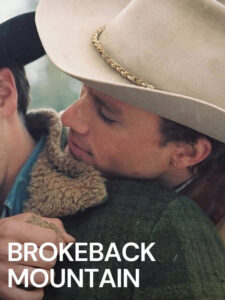
Brokeback Mountain: A Deep Dive into Love, Identity, and Societal Norms
Introduction
“Brokeback Mountain,” directed by Ang Lee and released in 2005, is a landmark film that reshaped the landscape of romantic dramas. Based on Annie Proulx’s short story, the film tells the poignant love story of two cowboys, Ennis Del Mar and Jack Twist, whose relationship transcends the boundaries of societal norms and expectations. The film’s exploration of forbidden love, identity, and the emotional complexities of desire resonates deeply with audiences, making it a modern classic. This essay will delve into the film’s plot, themes, character development, cinematography, and its cultural impact, providing a comprehensive analysis of its significance in contemporary cinema.
Plot Summary
Set against the backdrop of the American West in the 1960s, “Brokeback Mountain” begins with the introduction of Ennis Del Mar (Heath Ledger) and Jack Twist (Jake Gyllenhaal), two young men hired to herd sheep on Brokeback Mountain. Their initial interactions are marked by a sense of rugged masculinity and emotional restraint typical of the cowboy archetype. However, as they spend time together on the mountain, their bond deepens into a passionate love affair, characterized by both physical intimacy and emotional vulnerability.
Despite the profound connection they share, societal norms dictate that their relationship must remain a secret. Ennis and Jack return to their separate lives after their summer together, with Ennis marrying Alma (Michelle Williams) and Jack marrying Lureen (Anne Hathaway). The film poignantly captures the struggles they face as they attempt to navigate their marriages while longing for one another. Their love is fraught with tension and guilt, as they grapple with the demands of family life and the societal pressures that condemn their relationship.
Over the years, Ennis and Jack continue to meet in secret, their encounters filled with passion, regret, and an overwhelming sense of longing. As time passes, the limitations imposed by their environment and circumstances weigh heavily on their bond. The film culminates in a tragic conclusion that underscores the devastating effects of societal repression on their lives and love.
Themes
Forbidden Love
At the heart of “Brokeback Mountain” is the theme of forbidden love. Ennis and Jack’s relationship challenges the traditional notions of masculinity and heterosexuality prevalent in their society. The film explores the emotional depth of their love, portraying it as a natural and profound connection rather than a mere deviation from societal norms. Their love story is a testament to the idea that love knows no boundaries, yet it is suffocated by cultural attitudes that deem it unacceptable.
The secrecy surrounding their relationship creates an atmosphere of tension and urgency, as the men are forced to navigate their feelings in a world that refuses to accept them. The film poignantly illustrates the sacrifices they make for the sake of their love, highlighting the pain of living in a society that denies their existence.
Identity and Self-Acceptance
“Brokeback Mountain” also delves into the complexities of identity and self-acceptance. Both Ennis and Jack struggle with their identities as gay men in a society that stigmatizes homosexuality. Ennis, in particular, grapples with his internalized homophobia and fear of being discovered. His character embodies the conflict between societal expectations and personal desires, leading to a profound sense of isolation.
Jack, on the other hand, is portrayed as more open about his feelings, yearning for a life where he can openly express his love for Ennis. However, even he is constrained by the societal norms of the time, leading to frustration and despair. The film captures the emotional turmoil of both characters as they navigate their identities within the confines of a repressive society.
Regret and Loss
The theme of regret permeates “Brokeback Mountain,” as both men reflect on the choices they made throughout their lives. The film poignantly illustrates the consequences of their inability to fully embrace their love and the toll it takes on their happiness. Ennis’s regret is particularly palpable, as he often reflects on the life he could have had with Jack, haunted by the decisions that led to their separation.
The film’s exploration of loss extends beyond their romantic relationship, encompassing the loss of dreams, opportunities, and the ability to live authentically. The tragic ending serves as a powerful reminder of the cost of societal repression, leaving viewers with a profound sense of sorrow for the characters’ unfulfilled lives.
Character Development
Ennis Del Mar
Ennis Del Mar, portrayed by Heath Ledger, is a complex character whose emotional journey is central to the film. Initially presented as a stoic and rugged cowboy, Ennis’s vulnerability emerges as he navigates his feelings for Jack. His character embodies the struggle between societal expectations and personal desire, leading to a profound internal conflict.
Throughout the film, Ennis grapples with his identity and feelings of shame. His reluctance to fully embrace his love for Jack stems from a deep-seated fear of societal judgment and the consequences of being discovered. This fear manifests in his relationships with others, particularly with his wife, Alma, and his children. Ennis’s character arc is marked by moments of tenderness and pain, as he yearns for a connection with Jack while simultaneously pushing him away.
As the film progresses, Ennis’s emotional turmoil intensifies, culminating in a heartbreaking realization of the depth of his love for Jack. The tragic ending underscores the devastating impact of societal repression on his life, leaving viewers to grapple with the weight of his choices and the love he lost.
Jack Twist
Jack Twist, played by Jake Gyllenhaal, serves as a foil to Ennis’s character. While both men grapple with their identities, Jack is portrayed as more open and expressive about his feelings. His character embodies a sense of yearning for a life where he can openly love Ennis without fear of judgment.
Jack’s desire for a committed relationship with Ennis is evident throughout the film. He dreams of a life where they can be together openly, free from societal constraints. However, Jack’s optimism is continually met with Ennis’s reluctance, leading to moments of frustration and despair. Gyllenhaal’s portrayal of Jack captures the character’s vulnerability and longing, making his emotional journey deeply resonant.
As the film progresses, Jack’s character evolves from a hopeful romantic to a man burdened by the weight of unfulfilled dreams. His tragic fate serves as a poignant reminder of the consequences of societal repression and the emotional toll it takes on those who dare to love outside the confines of societal norms.
Supporting Characters
The supporting characters in “Brokeback Mountain” play crucial roles in highlighting the film’s themes and the struggles faced by Ennis and Jack. Alma, played by Michelle Williams, represents the societal expectations placed on women during this era. Her character embodies the pain of unfulfilled dreams and the complexities of love and loyalty. Alma’s gradual realization of Ennis’s infidelity adds emotional depth to the narrative, showcasing the ripple effects of Ennis and Jack’s relationship on those around them.
Lureen (Anne Hathaway), Jack’s wife, also serves as a representation of societal expectations. While she initially appears supportive, her character ultimately reinforces the limitations placed on both men. Lureen’s struggles with her own desires and the constraints of her marriage highlight the broader societal pressures that impact the characters’ lives.
Cinematography and Visual Storytelling
The cinematography of “Brokeback Mountain” is a vital component of its storytelling, enhancing the emotional depth of the narrative. Ang Lee and cinematographer Rodrigo Prieto employ breathtaking visuals to capture the vast landscapes of the American West, juxtaposing the beauty of nature with the internal struggles of the characters.
Landscape as a Character
The film’s setting on Brokeback Mountain serves as both a physical and emotional backdrop for Ennis and Jack’s relationship. The rugged mountains and open plains symbolize the freedom and isolation experienced by the characters. The use of wide shots captures the vastness of the landscape, emphasizing the characters’ emotional isolation amidst their surroundings.
The changing seasons throughout the film mirror the evolution of Ennis and Jack’s relationship. The beauty of summer on Brokeback Mountain contrasts sharply with the harsh realities they face in their everyday lives. This visual storytelling enhances the emotional impact of the narrative, allowing viewers to feel the weight of the characters’ struggles.
Intimate Close-Ups
In addition to the expansive landscapes, the film employs intimate close-ups to convey the emotional nuances of the characters’ interactions. These close-ups capture moments of tenderness, longing, and pain, allowing viewers to connect deeply with Ennis and Jack’s emotional experiences. The subtlety of their expressions speaks volumes, conveying the complexity of their love and the weight of their regrets.
The cinematography also employs contrasting lighting to highlight the emotional states of the characters. Dark, shadowy scenes often accompany moments of despair and conflict, while brighter scenes depict moments of connection and intimacy. This visual contrast reinforces the film’s themes of love, loss, and the struggle for acceptance.
Cultural Impact and Legacy
“Brokeback Mountain” has had a profound impact on both the film industry and societal attitudes toward LGBTQ+ representation. Upon its release, the film garnered critical acclaim and commercial success, breaking barriers for LGBTQ+ narratives in mainstream cinema.
Representation in Cinema
The film’s portrayal of a same-sex romance challenged traditional notions of love and masculinity in Hollywood. By presenting a nuanced and authentic depiction of gay love, “Brokeback Mountain” opened the door for more diverse stories to be told in cinema. The film’s success demonstrated that audiences were ready to engage with complex narratives that explored the intricacies of love and identity, regardless of societal norms.
Societal Conversations
The film also sparked important conversations about LGBTQ+ rights and acceptance in society. Its release coincided with a time of increasing visibility for LGBTQ+ issues, and “Brokeback Mountain” became a cultural touchstone for discussions surrounding love, identity, and societal acceptance. The film’s impact extended beyond the screen, influencing public perceptions and contributing to a broader dialogue about the rights and experiences of LGBTQ+ individuals.
Awards and Recognition
“Brokeback Mountain” received numerous accolades, including three Academy Awards: Best Director for Ang Lee, Best Adapted Screenplay, and Best Original Score. The film’s recognition at prestigious award ceremonies further solidified its place in cinematic history and underscored its significance as a groundbreaking work.
Conclusion
“Brokeback Mountain” is a poignant and powerful exploration of love, identity, and societal norms. Through its compelling narrative, richly developed characters, and breathtaking cinematography, the film captures the complexities of forbidden love and the emotional weight of living in a repressive society. Ennis and Jack’s story resonates with audiences, inviting reflection on the nature of love and the sacrifices made in the pursuit of happiness.
As a modern classic, “Brokeback Mountain” has left an indelible mark on cinema and continues to inspire discussions about representation, acceptance, and the enduring power of love. Its legacy serves as a reminder of the importance of telling diverse stories and the impact of art in shaping societal attitudes. In an ever-evolving cultural landscape, “Brokeback Mountain” remains a timeless exploration of the human experience, transcending boundaries and touching the hearts of audiences around the world.

